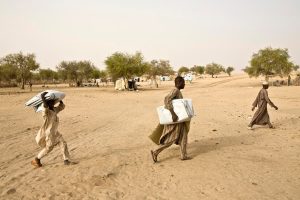The Sahel: A Crisis Zone Marked by Turmoil, but Rich in Untapped Potential
Despite Security Challenges, Sahel Remains ‘a Region of Opportunity and Hope’ – UN Coordinator”

As violence and instability intensify across the Sahel, the region remains trapped in a deepening security crisis that endangers millions. Yet beneath the surface lies a web of complex social and economic challenges that often go overlooked.
The roots of the Sahel’s instability run deep, fueled by a volatile mix of ethnic tensions, fragile governance, and the unchecked spread of extremist groups.
According to Abdoulaye Mar Dieye, the UN Secretary-General’s Special Coordinator for Development in the Sahel, the ongoing crisis represents only one facet of a much broader reality.
“The Sahel is more than its crisis. It is also a land of opportunity and hope,” Dieye said in an interview with Anadolu Agency in Dakar, Senegal.
“That said, I don’t want to minimize the seriousness of the crisis—it is real, it is present.”
While much of the turmoil is traced back to northern Mali, Dieye emphasized that the crisis truly took root after the collapse of Libya, which triggered a cascade of destabilizing effects across the region, including the spread of terrorism.
Since 2012, Mali has grappled with a prolonged conflict driven by separatist movements and terrorist networks, especially in the north and central regions.
“The world owes a massive debt to the Sahelian countries—a debt that remains unpaid,” Dieye asserted.
More Than a Security Crisis: A Development Emergency
Dieye stressed that the crisis is not only political or ideological but fundamentally economic. A lack of development and a vacuum of state presence in remote border areas have left many communities vulnerable to extremist recruitment.
In interviews with former militants, Dieye found that most had no deep understanding of the Quran, indicating that their involvement was not driven by religious ideology.
“They had no jobs. The terrorists offered them a bit of money, so they followed,” he said.
“The majority involved in terrorism are not ideologically driven. This is a purely economic crisis.”
Dieye rejected the notion that the Sahel or Africa is poor. Instead, he pointed to the region’s immense natural wealth—mismanaged and underutilized for decades. Mali, for instance, was the second-largest gold producer in Africa and ranked 11th globally in 2024, according to the World Gold Council.
“These countries are not poor. It’s poor management of resources that has held them back,” he emphasized.
“Just gold alone could double Mali’s GDP—let alone cotton and other minerals.”
Terrorism Knows No Borders
Dieye warned that the security threat transcends national boundaries. From Senegal to northern Benin, Togo, and as far as Grand-Bassam in Côte d’Ivoire, extremist groups exploit border vulnerabilities.
Senegal, recognizing the transnational threat, has reinforced military defenses along its border with Mali and invested heavily in human development and infrastructure in border regions.
The UN has also backed multi-country initiatives connecting Mauritania, Senegal, and Mali, as well as Senegal, Guinea-Bissau, and Guinea, aiming to stabilize communities most at risk.
“It’s not at two borders, but at triple-border zones where terrorism takes root most aggressively,” Dieye noted.
“These are the hotspots of extremism.”
He also highlighted the role of religious influence in maintaining stability, particularly in Senegal. The strong presence of Sufi brotherhoods like Tijaniyya and Mouridism—both of which advocate peace and spiritual discipline—has served as a buffer against extremist ideology.
“That spiritual capital is key to Senegal’s resilience—not just against terrorism, but for social cohesion overall,” he said.
Türkiye’s Expanding Role in the Sahel
Dieye praised Türkiye’s approach to development in the region, emphasizing its soft diplomacy and growing technological footprint as valuable assets in building long-term stability.
He expressed interest in collaborating with Turkish tech institutions to help equip Sahelian youth with skills in mining, industry, and advanced technologies.
“There’s real potential for Türkiye to invest in this space. It’s known for technological advancement, and the Sahel could benefit tremendously,” Dieye said.
Ankara’s low-profile, partnership-driven approach has won it goodwill in the Sahel. The UN supports what it calls a “win-win” partnership model that could position Türkiye as one of the region’s top development and commercial allies.
“The UN deeply values its relationship with Türkiye and stands ready to support collaboration that fosters economic growth, social progress, and political stability in the Sahel,” Dieye concluded.






